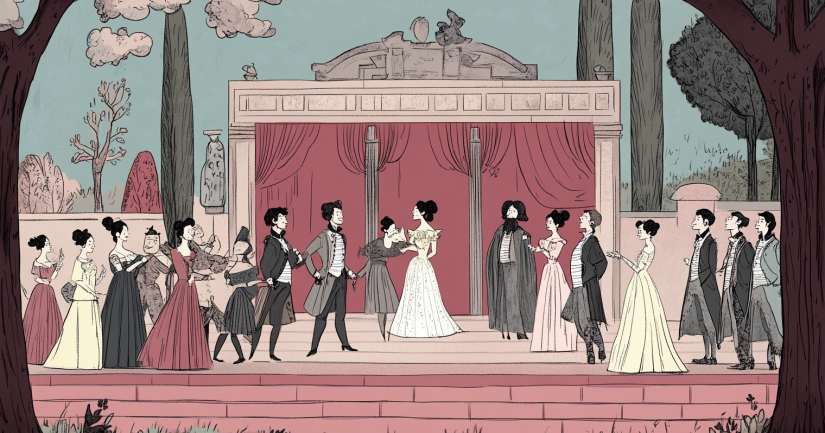
The Much Ado About Nothing Character Matching Quiz offers an engaging exploration into the intricate personalities and relationships within William Shakespeare’s renowned play. By delving into the distinct traits and dynamics of each character, readers can gain a deeper appreciation for the narrative’s complexity and enduring appeal.
In “Much Ado About Nothing,” Shakespeare masterfully crafts a tapestry of characters whose interactions drive the plot’s comedic and dramatic elements. The Much Ado About Nothing Character Matching Quiz encourages readers to analyze these interactions, fostering a comprehensive understanding of character motivations and developments.
You’ve matched the characters, but do you know which one you’re most like? Find out with Which Much Ado About Nothing Character Are You Quiz! Want to refine your Shakespearean vocabulary? Test yourself with Much Ado About Nothing Vocabulary Quiz. And for the ultimate challenge, see how well you know the entire play with Much Ado About Nothing Full Book Quiz!
Furthermore, this quiz prompts readers to consider the broader themes of the play, such as deception, honor, and the nature of love, as reflected through the characters’ actions and relationships. Engaging with the Much Ado About Nothing Character Matching Quiz not only tests one’s knowledge but also deepens one’s connection to the timeless human experiences portrayed in the play.
Beatrice and Benedick: The Witty Adversaries
Beatrice and Benedick stand out as two of Shakespeare’s most beloved characters, known for their sharp wit and spirited banter. Their “merry war” of words masks a deeper affection, which is cleverly brought to light through the orchestrated efforts of their friends. This dynamic showcases Shakespeare’s exploration of love’s complexities and the transformative power of self-awareness.
Claudio and Hero: The Innocent Lovers
Claudio and Hero represent the archetype of young, idealistic love, which is tested by external manipulations and internal insecurities. Claudio’s susceptibility to deceit and Hero’s passive endurance highlight themes of trust, honor, and the societal expectations placed upon individuals. Their journey underscores the consequences of hasty judgments and the redemptive potential of forgiveness.
Don Pedro and Don John: The Contrasting Brothers
Don Pedro, the noble Prince of Aragon, serves as a catalyst for the play’s romantic entanglements, using his influence to unite couples. In stark contrast, his illegitimate brother, Don John, embodies malice and envy, seeking to sow discord and ruin happiness. This dichotomy between the brothers emphasizes the duality of human nature and the impact of personal choices on communal harmony.
Leonato and Antonio: The Familial Pillars
Leonato, as the governor of Messina and father to Hero, represents authority and the weight of social reputation. His reactions to the unfolding events reflect the tension between paternal duty and societal pressure. Antonio, Leonato’s brother, provides support and counsel, highlighting the importance of familial bonds and the collective response to personal crises.
Dogberry and Verges: The Comic Relief
Dogberry, the bumbling constable, and his deputy, Verges, offer comedic interludes that juxtapose the play’s more serious themes. Their malapropisms and misunderstandings inadvertently lead to the revelation of Don John’s treachery, illustrating how truth can emerge from unexpected sources. Their roles underscore the value of sincerity over eloquence and the unpredictability of justice.
Margaret and Ursula: The Supporting Confidantes
Margaret and Ursula, attendants to Hero, play pivotal roles in the development of the central romances. Ursula assists in the scheme to unite Beatrice and Benedick, while Margaret becomes an unwitting participant in Don John’s plot against Hero. Their involvement highlights the influence of secondary characters in the progression of the narrative and the unintended consequences of seemingly innocuous actions.
Conclusion: Embracing the Ensemble
The Much Ado About Nothing Character Matching Quiz serves as a valuable tool for readers to engage deeply with the play’s rich tapestry of characters. By examining the distinct roles and relationships within the ensemble, readers can appreciate the intricate interplay of personalities that drive the story’s enduring relevance and emotional resonance.
Much Ado About Nothing Quizzes: Love, deception, and wordplay …
Much Ado About Nothing Characters – FAQ
The main characters in William Shakespeare’s Much Ado About Nothing include Benedick and Beatrice, a witty pair engaged in a battle of wits, and Claudio and Hero, whose romance is central to the plot. Don Pedro, the Prince of Aragon, plays a crucial role in orchestrating events, while his brother, Don John, serves as the antagonist. Other notable characters include Leonato, Hero’s father, and the comedic duo Dogberry and Verges.
Benedick and Beatrice share a complex relationship characterized by their sharp, humorous banter. Though they initially appear to disdain each other, their exchanges reveal a deep-seated affection. Over the course of the play, they are tricked into admitting their love, leading to a deeper understanding and eventual union.
Claudio starts as a young, impressionable soldier who quickly falls for Hero. However, his character is tested by jealousy and deception, leading him to publicly shame her. Through repentance and reconciliation, Claudio matures, learning the value of trust and forgiveness, ultimately leading to a happy resolution.
Don John is the primary antagonist in Much Ado About Nothing. Motivated by envy and bitterness, he schemes to disrupt the happiness of others, particularly by sabotaging Claudio and Hero’s relationship. His actions create the central conflict, propelling the plot toward resolution as his deceit is uncovered.
Dogberry and Verges provide comic relief through their bumbling antics and malapropisms. As the local constables, their incompetence ironically leads to the unraveling of Don John’s plot. Their humor and unintentional wisdom add to the play’s lighthearted tone, balancing the more serious themes.
